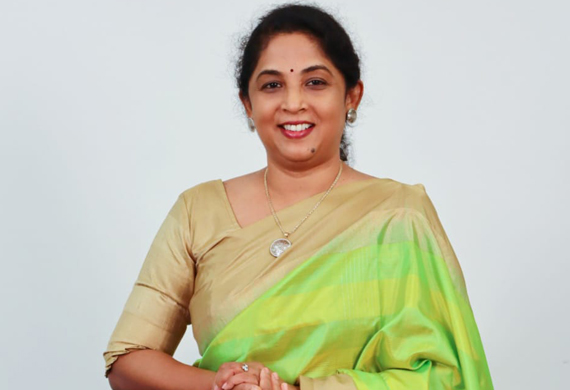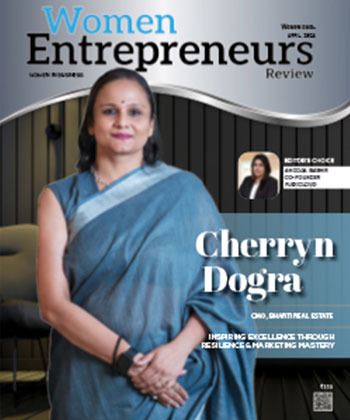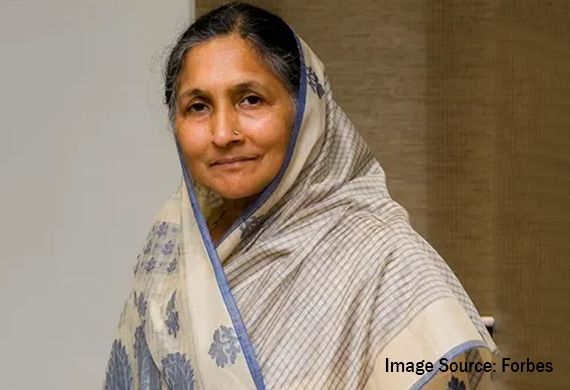
'Cyber Safety a Fundamental Right for All' believes Quick Heal's, Anupama Katkar
By: Anupama Katkar, Chairperson of Quick Heal Foundation and Chief of Operational Excellence, Quick Heal Technologies Limited
Anupama Katkar is the Chairperson and the driving force behind Quick Heal Foundation, the Corporate Social Responsibility (CSR) arm of Quick Heal Technologies Limited. Through various commendable initiatives, she endeavors to make a positive impact by empowering millions of Indians in the areas of healthcare, cybersecurity awareness, and education. With a dedicated focus on the mission of "Securing Futures," she has been the backbone of the organization, steering it towards a forward-looking, sustainable, and driven path.
In a conversation with Women Entrepreneur India magazine, Anupama shares her views on the Indian software industry's futuristic structure. During the conversation, she also discussed how to lead people while fostering efficiency to keep the company valued and lucrative.
Enlighten us about your Quick Heal journey and how it has aided your professional success.
I've been fortunate to witness Quick Heal's growth from a small start-up to a leading player in cybersecurity. My journey began over two decades ago when my husband founded the company. It's been both challenging and rewarding, teaching me valuable lessons in leadership, teamwork, and resilience. One key takeaway is to have an undeterred determination to make the most of the given platform and the opportunity at hand. At the same time, being adaptable to new ideas and technologies to stay ahead of the constantly evolving industry. Secondly, building strong relationships with stakeholders across, it is critical to creating a loyal customer base and a motivated workforce, and market equity. Lastly, giving back to society for mutual growth and well-being of communities at large is of utmost importance to me personally, which is why I lead the CSR initiative that has the purpose of securing futures. Our programs have touched more than 30 lakh lives so far and this brings me the most satisfaction.
Tell us about the strategic priorities and actions you'll take this year to help the company's business expansion.
At Quick Heal, our focus for the company's business expansion is centered around three key strategic priorities. Our first objective is to strengthen our product portfolio by investing in research and development. We aim to develop innovative yet sustainable products that cater to the evolving needs of our customers. To achieve this, we are investing heavily in research and development to build products that provide comprehensive protection against new and emerging threats with a reduced carbon footprint. Our second key objective is to expand our presence in international markets while expanding our product portfolio. We recognize that there is a significant opportunity for growth in international markets, and we are taking steps to establish our presence in these markets. This includes identifying potential markets, building strategic partnerships, and investing in marketing and sales initiatives to raise awareness about our products. All this, while our team of experts is constantly innovating and expanding our product portfolio and focusing on improvements to unlock greater efficiencies for our customers.
Lastly, through each facet of our business, we are tirelessly working towards spreading awareness on cyber safety amongst one and all. Be it our PR and marketing efforts or our dedicated CSR programs, it is one of our goals to make ‘cyber safety a fundamental right for all’ by spreading awareness of digital risks and their prevention to create a safe and secure world.
How must one lead people while fostering efficiency to keep the company valued and lucrative?
Leading people while fostering efficiency is crucial to keep a company valued. A leader must focus on building a strong culture, developing effective communication, and providing the necessary training and resources to the team. By doing so, a leader can create a sense of community and shared goals among employees, ensuring that everyone is on the same page and working towards the same goals. We are a purpose-driven organization thus we include all stakeholders including employees to create a positive impact on marginalized communities and in society at large. By including them, we enable each of our employees to make a direct impact on society while deriving a greater sense of satisfaction.
Tell us about Quick Heal Technologies’ special project, intended to enhance healthcare services in India's rural interiors. Why is it so important to you to give back to society through worthwhile philanthropic and social service endeavors?
Our CSR initiative with the purpose of 'securing futures', is aimed at empowering communities and society in India. One of our special projects under this initiative is the Arogya Yan program, which has impacted over 5 lakh rural residents and 448 members of President Protected Tribes. The program involves donating 15 fully-equipped medical vans across 10 states to cover more than 600 remote villages, enabling access to healthcare services in India's rural interiors. We have also launched the Modamrut Yan program, which is an extension of the Arogya Yan initiative, aimed at providing proper nutrition and healthcare to at-risk communities. These vans are manned by paramedic staff and are capable of undertaking small surgeries as well. These efforts are focused on improving the quality of life for those in need, particularly in rural and underdeveloped areas that lack adequate resources.
At Quick Heal, we believe that giving back to society is not just a responsibility, but a privilege. We are committed to creating a better India with equal opportunities for all and consider it our duty to contribute positively to the communities we serve. Our philanthropic and social service endeavors align with our core values of integrity, compassion, and excellence. We are proud to improve healthcare, education, and livelihood opportunities for those in need. Giving back to society is our way of expressing gratitude for our success, and we remain dedicated to creating a brighter future for all.
What is the Indian software industry's futuristic structure, in your opinion?
There is subdued growth expected due to the global slowdown, however, this is just a temporary phase. With India already being a global leader in software development and IT services and looking to leverage the AI capabilities as on our budget this year, the future of the Indian software industry looks very promising, the industry will be driven by the large pool of talented engineers and developers, coupled with India's favorable business environment and low labor costs. As we move towards the future, the industry is expected to shift towards more innovative and cutting-edge technologies such as AI, Blockchain, and IoT. The Indian government has launched several initiatives to promote the adoption of these technologies across different sectors. Another trend that is likely to emerge is the growth of software-as-a-service (SaaS) and cloud-based solutions. Indian companies are well-positioned to leverage this trend, as these technologies are becoming increasingly popular among businesses of all sizes. Overall, the Indian software industry is expected to continue to grow and play a crucial role in the global technology landscape.






